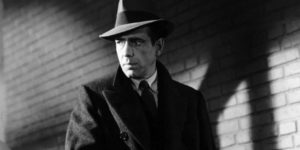I just finished reading Raymond Chandler’s Farewell, My Lovely. I’ve previously read his The Big Sleep, and several of his novelettes.
Way in the past, I read Hammett’s The Maltese Falcon and a few of his Continental Op stories.
My opinion of hardboiled fiction is that I like it and want to read more. In fact, I like it so much I may decide to write some of my own.
There’s a lot of confusion between hardboiled and noir. Some people think the two are the same thing, but they are not. I actually see them as being something of opposites.
Noir is about victims and everyone loses in the end. It’s pretty nihilistic.
Hardboiled is about the detective hero, and in the end he wins. The victory may be small, but he still wins.
In a sense, Noir and Hardboiled are the two sides of existentialist philosophy. The one which says life has no meaning, no purpose, and it’s probably best if we just die. And the other, which says life is meaningless in and of itself, and we have to give it meaning. In other words, we find our own meaning and value in life and that’s what makes it meaningful to us.
Let’s look a little deeper at the characteristics of the hardboiled detective.
The hardboiled detective sub-genre was created by Carrol John Daly in the 1920s, and was refined by Dashiell Hammett. It was raised to the level of fine literature by Raymond Chandler, and given an unparalleled psychological depth by Ross Macdonald.
In the hardboiled world
-
-
- the private investigator is the hero
- he acts tough, talks tough, and often is tough
- the PI is a loner
- he has a code of honor and justice that is moral, if not strictly legal
- no matter what, the PI won’t give up the case, or betray a client
- individuals battle a corrupt political organization, or a criminal one — it’s the one agains the many
- the PI prevails because he’s true to himself and his code
- he’s a smart-aleck, and talks that way
- he’s cynical about the world at large
- even though the PI solved the case, the solution does little to alter the larger picture of political, societal, and human corruption
- the PI wins a small victory, and that’s all he can hope for, but he was true to himself
-
I think the hardboiled worldview is very apropos for today. There is so much crap going on in the world that one can easily despair, or become insanely angry.
What the hardboiled detective teaches us is that the world ain’t gonna change — but we can rise a little bit above the dirt, the corruption, the wickedness by being true to ourselves, and by sticking to a standard of right and wrong no matter what.
The personal integrity of the individual honoring his word and sticking to his moral principles — no matter what’s going on around him — is, for me, a source of inspiration. Because, it means, no matter how hopeless things are or seem to be, in a small way I can make a difference.
What I do may not change the world, but it may help someone, it may bring peace of mind, or a bit of fairness to someone else’s life. And, realistically speaking, that is probably all we can ever hope for.
The hardboiled world is dark and grim, and slightly dystopian. It’s a world where the big forces crush the little people. And it’s a world where the PI keeps the hope of fairness, equity, and justice alive.
Every day we read of political corruption, corporate corruption, of society’s indifference, of people making money from destroying the environment, and from using other people.
The hardboiled PI shows us that we, as individuals, can keep the goodness that is in humanity alive.
And I like that.
Comments are always welcome. And until next time, happy reading!
Share This!